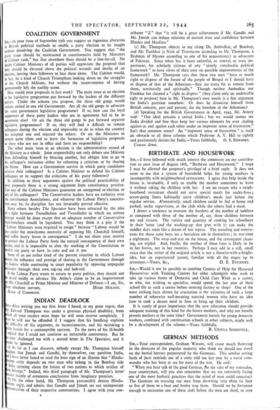COALITION GOVERNMENT
sta,—In your issue of September 15th you suggest an ingenious alteration in British political methods to enable a party election tb be fought without dissolving the Coalition Government. You suggest that " the
party truce should be maintained in constituencies held by Ministers of Cabinet rank," but that elsewhere there should be a free-for-all. No
doubt Cabinet Ministers of all parties will appreciate the proposal that they should. be elevated above the political wounds and deaths of an election, leaving their followers to face them alone. The Cabinet would, in fact, be a kind of Church Triumphant looking down on the struggles of the Church Militant, but without the inconvenience of having permanently left the earthly scene. flow would your proposals in fact work? The main issue at an election is the legislative programme put forward by the leaders of the different parties. Under the scheme you propose, the three old gangs would remain united in one old Government. Are all the old gangs to advocate the same government legislative programme? If so, how can the loyal supporters of these party leaders who are in agreement fail to be in agreement also? Or are the three old gangs to put forward separate legislative programmes? If so, they will fmd it difficult to remain colleagues during the election and impossible to do so when the country has accepted one and rejected the others. Or are the Ministers to remain quite silent and to leave the formation of legislative proposals to those who are not in office and have no responsibility?
The other main issue at an election is the administrative record of the Ministry as a whole. Joint responsibility not only debars one Minister from defending himself by blaming another, but obliges him to go to his colleague's assistance either by rebutting a criticism or by sharing the blame. How can a Government survive in which party candidates criticise their colleagues? Is a Cabinet Minister to defend his Cabinet colleagues or to support the criticisms of his party followers?
In addition to these arguments against the political practicability of your proposals there is a strong argument from constituency practice. Can any of the Cabinet Ministers guarantee an unopposed re-election to any of his colleagues? The Conservative leaders have no authority over the constituency Associations, and whatever the Labour Party's constitu- tion may be, its discipline has not invariably proved effective.
Many others besides The Spectator have been attracted by the idea of a fight between Tweedledum and Tweedledee in which no serious damage would be done except that an adequate number of Conservative back-benchers would be liquidated. You may think it a pity if the "Labour Ministers were required to resign " because " Labour would be put under the unwelcome necessity of opposing Mr. Churchill himself, and suffer heavy losses in consequence." I do not share your anxiety to protect the Labour Party from the natural consequence of their own non, and it is impossible to alter the working of the Constitution to ab!e any party to have its cake and eat it too.
Some of us are rather tired of the present situation in which Labour joys the influence and prestige of sharing in the Government through is leaders while continuing to court popularity by opposing unpopular easures through their own rag-tag and bob-tail.
If the Labour Party wants to return to party politics, they should not afraid boldly to advance Mr. Attlee's claim to be an improvement a Mr. Churchill as Prime Minister and Minister of Defence.—I am, Sir,


























 Previous page
Previous page